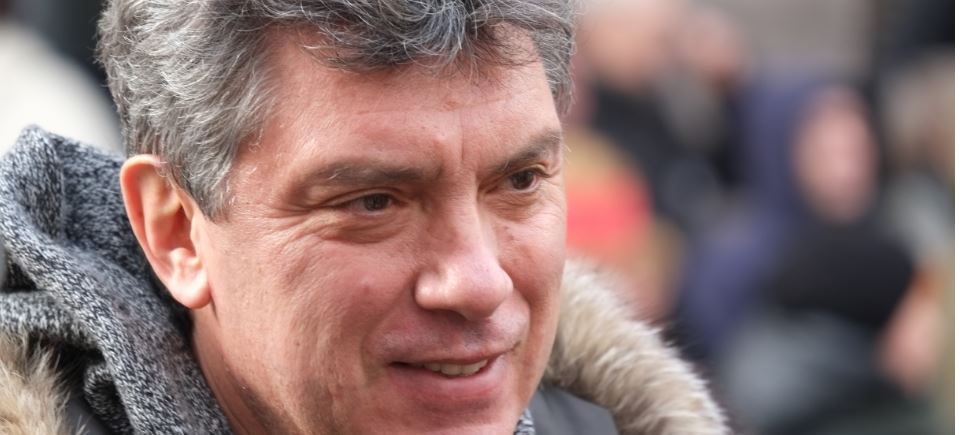A few hours before bullets ripped through his body and stilled forever a brave voice, the Russian opposition leader Boris Nemtsov was, yet again, tempting fate. Like few others in Russia, Nemtsov was willing to publicly excoriate the policies of Russia’s president Vladimir Putin, to call into question Putin’s designs and more importantly, his veracity.
He knew he was risking his life, but he refused to leave Russia and refused to stay quiet. He told one journalist that he hoped his former position as a deputy prime minister would keep him safe. It didn’t.
Shortly before his assassination, Nemtsov had again let fly, on radio in Moscow, saying honest elections were essential for Russia’s future, and censorship had to be cancelled to stop “this absolutely miserable, lying propaganda that has overturned the minds and has eaten the minds of the Russian people”.
A short time later he was lying dead on a cold Moscow pavement near the Kremlin, riddled with the bullets of the faceless assassin who shot him in the back.
 Nemtsov is the latest name on a long and sobering list of Putin critics who have wound up dead: Litvinenko, Politkovskaya, Markelov, Estemirova. Once a deputy prime minister, Nemtsov had been particularly exercised about Russia’s part in the year-long conflict in Ukraine, which he once described as “Vladimir Putin’s war”. When he was killed, he was apparently planning to publish a document potentially “proving” Russia’s direct involvement with the separatist rebellion that erupted in Ukraine last year.
Nemtsov is the latest name on a long and sobering list of Putin critics who have wound up dead: Litvinenko, Politkovskaya, Markelov, Estemirova. Once a deputy prime minister, Nemtsov had been particularly exercised about Russia’s part in the year-long conflict in Ukraine, which he once described as “Vladimir Putin’s war”. When he was killed, he was apparently planning to publish a document potentially “proving” Russia’s direct involvement with the separatist rebellion that erupted in Ukraine last year.
NATO and Washington believe Russia is arming and backing Russia-aligned separatists in this rebellion, an assertion Moscow denies, yet western scepticism has been fuelled by the many sophisticated heavy weapons the rebels have been using to devastating effect. The commander of the US army in Europe, Lieutenant-General Frederick Hodges, last week directly accused Russia of deploying 12,000 troops in eastern Ukraine.
Nemtsov, for his part, was appalled by what he saw as Russia’s incursions in Ukraine, publicly dubbing Russia’s part in the conflict with Ukraine as “insane, aggressive, murderous” and the work of Putin’s despotic ambitions. The latest ceasefire agreement signed in Minsk in February is often ignored.
Economic sanctions levelled against Russia have been ratcheted up by western nations in an effort to pressure Moscow to loosen its grip on eastern Ukraine. These sanctions, and the plunging price of oil, have rattled Russia’s economy. Both Standard & Poor’s and Moodys have downgraded their ratings on Russia’s sovereign bonds to junk status, and the sanctions have driven international investors out of its currency and financial markets
But Putin hasn’t flinched, and many observers wonder whether threats to increase these sanctions will make any difference. The man who has been in charge of Russia for so long seems unfazed by his nation’s suffering, and unworried, too, by the blood already spilt in Ukraine, as many as 6,000 dead according to some counts. Yet Putin has whipped up a fury of Russian nationalism and he is now riding high in the polls. A Russian climb-down in Ukraine seems increasingly unlikely.
But some action has to be taken. The Ukraine conflict is a mess: eastern Ukrainians don’t trust either Moscow or Kiev and Russian separatist rebels (Russian proxy forces) are increasingly dominated by criminals.
There have been mistakes on both sides. The west underestimated Russia’s sensitivity and hurt pride at NATO’s eastwards expansion, and Russia underestimated the west’s resolve in defending the international legal structures that have kept the world safe since 1945: the inviolability of international borders and Article 51 of the UN charter that says force can only be used in defence or if the Security Council approves. Russia’s blatant use of proxy forces shows how badly equipped the international legal system, and the UN, is to counter non-traditional threats.
Ukraine’s future looks grim. It seems the nation’s west-leaning president, Petro Poroshenko, elected last year, will have to come to some form of accommodation with Russia: it’s hard to see Ukraine thriving economically while hostilities continue with the giant nation to its east.
The west cannot afford to be seen as weak, and some principles such as the status of Ukraine’s borders are non-negotiable, but if sanctions levelled against Russia don’t work, and the costs of aggression are no deterrent, perhaps the only choice is for the west to swallow its fury and quietly offer Russia a face-saving solution: a few rewards to wind back the fighting, perhaps, while at the same time making it clear that continuing confrontation will have increasingly steep costs.
Putin might even take the bait.
http://www.smh.com.au/comment/smh-editorial/russian-opposition-leader-paid-dearly-for-his-courage-20150302-13star.html